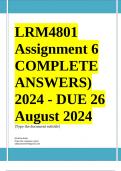LRM4801
Assignment 6
COMPLETE
ANSWERS)
2024 - DUE 26
August 2024
[Type the document subtitle]
[Pick the date]
[Type the company name]
tabbymwesh59@gmail.com
, )
Book
Managing Employment Relations
LRM4801 Assignment 6 COMPLETE ANSWERS) 2024 - DUE 26 August
2024 ; 100% TRUSTED Complete, trusted solutions and explanations. Ensure
your success with us..
Question 1: Labour legislation and collective agreements Access the NOTICE
TO INITIATE INDUSTRY NEGOTIATIONS – ENGINEERING 2024. WAGE
NEGOTIATIONS AND OTHER SUBSTANTIVE ISSUES by clicking on the
link. You can access the notice online, download it, save it on your computer,
or print it. It is, however, important to refer to this notice when answering the
following questions: One of the submissions made by NUMSA is the request
to extend the Main Agreement to all non-party employers and employees.
Identify and discuss the relevant provisions of South African labour legislation
that govern the extension of Main Agreements to non-parties. Evaluate the
fairness and justifiability of extending the Main Agreement to non-party
employers and employees in the Metal and Engineering Sector. [10] Question
2: Strategic employment relations Please visit the following link to access the
website of ArcelorMittal South Africa (AMSA): Navigate to sections that outline
their vision, mission, and strategy, typically found under headings such as
“About Us” or “Who we are”. Additionally, search for sections that detail their
approach to human resources, employee development, and workplace
culture. Based on the information provided on AMSA’s website, critically
evaluate how their stated vision, mission, and strategic objectives align with
fostering positive employment relations within the company. [10] Question 3:
Labour relations infrastructure Read the following fictitious labour relations
policy of an engineering firm in South Africa and answer the question that
follows: Labour Relations Policy of ABC Engineering 1. Purpose The purpose
of this policy is to establish guidelines and practices that prioritise operational
efficiency and management control while ensuring compliance with applicable
laws and regulations. 2. Principles • Management authority: Management
retains sole authority over all employment decisions, including hiring,
promotion, transfer, and termination, without obligation to justify decisions to
employees or their representatives. • Limited employee representation: The




